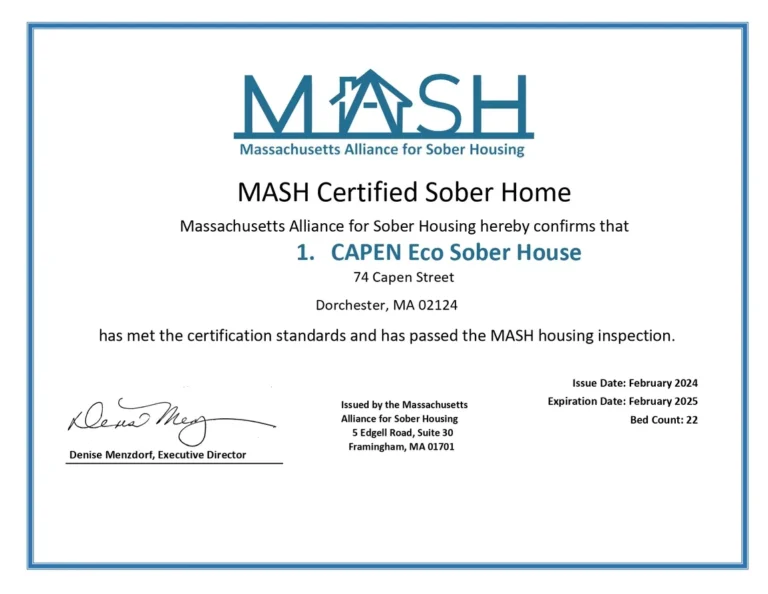
Many sober houses assign a daily chore to each resident that must be completed. If the resident consistently fails to complete this chore, they can be evicted from the residence.Attend any weekly meetings. A sober house will often have a weekly recovery meeting that they require all residents to attend. Some sober houses will require the resident attends all meetings while others will only require a minimum amount. You should also ask about the program’s cost and any financial assistance that may be available.

Sober Living Homes & Oxford Houses
While not all homes offer direct therapeutic services, they often connect residents to essential local resources like counseling or job placements. NCBI research consistently shows higher sobriety rates among those who choose sober living homes, especially for longer stays. By choosing to pursue a challenging transitional phase of recovery at a sober living home, you may minimize the likelihood of relapse derailing your recovery before it gets traction. Addiction is a chronic and relapsing brain disorder with relapse rates of between 40% and 60% similar to the relapse rates of other chronic health conditions. Boost your chances of sustained sobriety by reaching out to Gratitude Lodge for sober living in California. If someone you know or love is coming out of an inpatient program or rehabilitation facility, a sober house can be a great way to gently reintroduce them back to society without overwhelming them.

What are the requirements for becoming a resident, and how long can someone stay in an Oxford House?
- Join our supportive sober community where each day becomes a step towards personal growth and lasting positive change.
- People can experience specific challenges in recovery depending on their gender.
- Level III homes employ administrative staffers, such as a facility manager and certified staff of case managers, and maintain an organizational hierarchy.
- This ensures that residents have ongoing support as they work towards total independence.
- Ensuring that the administration of an SLH or halfway house is vigilant about complying with any kind of necessary inspections is an important part of establishing its validity as a reputable residence.
Abiding by house rules and showing consistent responsibility rebuilds trust with families, peers, and oneself, enhancing self-esteem. Sober living homes are a critical component of the recovery landscape, offering numerous benefits but also facing distinct challenges. For those considering this option, it’s important to weigh these factors carefully and choose a home that best meets individual recovery needs.
- Historically, the proliferation of inpatient and residential treatment programs in the 1960s and 1970s marked a critical shift in addressing substance abuse.
- This is where a sober living house for extended stays can make a significant difference.
- Sober living homes act as a bridge between the highly structured environment of inpatient rehab facilities and the numerous challenges of returning to everyday life.
- It is important to note that these rules and regulations are designed to create a supportive and accountable environment.
- In this kind of house, you simply pay a monthly fee for rent, maintain attendance in recovery groups, stay sober, and participate in household duties.
- Most sober living homes do not offer formal addiction treatment but utilize programs in the broader community.
- Sober living caters to individuals battling various substance addictions, including alcohol.
Does Health Insurance Cover Sober Living?
Many of the rules within a sober living program correspond with the types of rules an everyday household follows. In effect, this rule structure picks up where detox and residential programs leave off in terms of creating structure within a semi-independent living environment. The houses are run by residents and emphasize peer support as an essential component of recovery. It also provides a therapeutic space where you can get support from peers who are also recovering from substance abuse. There are also specific types of sober living homes that cater to your gender, age, and in some cases, profession. They also tend to be affiliated with addiction treatment centers that provide outpatient programs.

How Sober Living Houses Work
Therefore, many offer flexible payment options, including sliding scale rates. They may also assist residents in finding employment, allowing them to defer payments. This approach makes sober living more attainable for those lacking immediate funds. These function as facilities where individuals who were previously homeless can live as they begin to find stability and move towards securing independent housing. While residents may have completed formal treatment, extended stays in SLHs allow continuous access to resources like counseling sessions, group therapy, or job training programs. This ensures that residents have ongoing support as they work towards total independence.
Some sober homes do not require residents to pay utility bills, but utilities may be rationed to avoid waste. The daily schedule at sober living homes is heavily what is a sober house influenced by the residents’ current stage of recovery. Some homes are highly structured, with strict schedules and consistent eating and meeting times.
Most treatment facilities can help determine if your insurance is eligible for outpatient rehab. Living in a sober home will be similar to living in rehab, but here, you will continue to work or go to school and have financial independence. You’ll still attend group meetings and have a support system, but you can come and go out of the home whenever you’d like. There still are curfews, a no-tolerance policy toward alcohol and drugs, and other rules in place to ensure that residents can thrive in a positive, encouraging environment. You can join a sober living home immediately after rehab, or you may find that adjusting to life outside of rehab is difficult.
Health Improvement
- Sober living homes offer safety and support for people recovering from drug or alcohol abuse.
- By choosing to reside in a sober living home, you’re not just finding a place to stay; you’re joining a community committed to mutual support and recovery.
- Any areas that the residents use such as the kitchen or bathroom will also need to be cleaned after use.Daily chores must be completed.
- Due to how interchangeably these terms are used, it is important to ask questions about expectations and structure to determine which home is the right fit for you.
- For many people recovering from alcohol use disorder, this means implementing lifestyle changes such as new social circles, new settings, and new behaviors.
- But many sober homes require residents to attend support group meetings or participate in 12-step programs or outpatient treatment, which may be an additional cost for residents to consider.
Medication-assisted treatment (MAT) is recognized as an effective recovery tool when combined with supportive services, enhancing both engagement and outcomes for individuals in recovery from addiction. According to the National Alliance for Recovery Residences (NARR), MAT includes physician-prescribed medications that are part of a comprehensive treatment plan. There are important legal and operational guidelines that sober living homes must follow regarding MAT. Some people face challenges in maintaining a stable and drug-free living environment due to various factors, such as unstable housing, strained family relationships, or lack of a supportive network.

Most homestays will cost between $500 to $1,200 monthly, with all services included. But they can be anywhere between $300 and $2,000, depending on the neighborhood and amenities. Residents are encouraged to share their experiences, learn from one another, and help each other stay accountable. In addition to the support from fellow residents, many Oxford House members also participate in external recovery programs and support groups, further strengthening their commitment to sober living. As part of a comprehensive addiction treatment plan, recovery housing like Oxford Houses can play a crucial role in helping individuals stay in treatment and maintain their sobriety.
